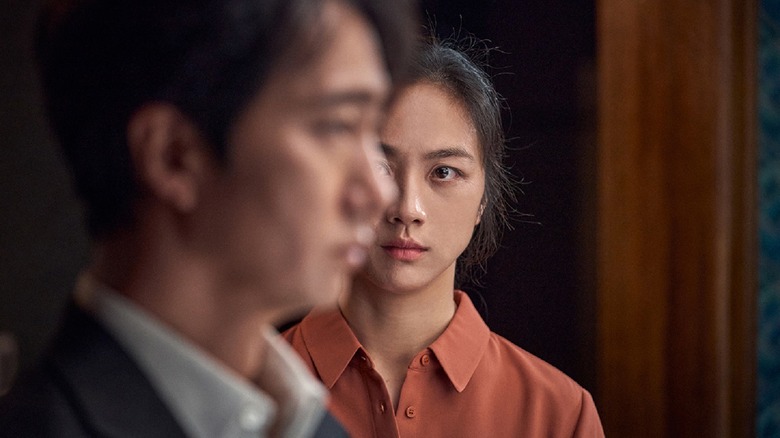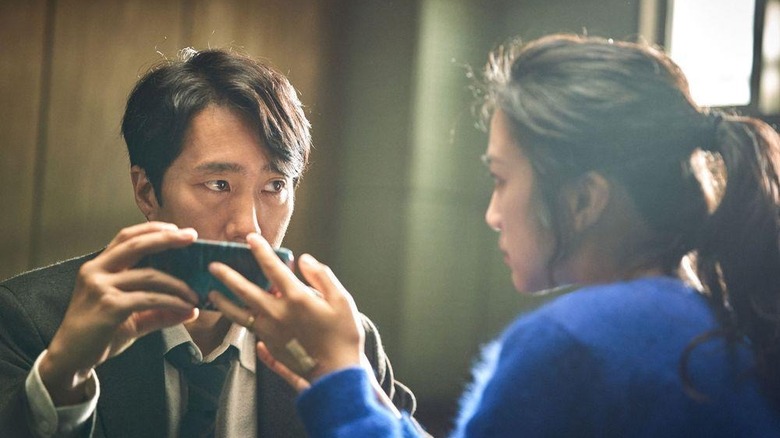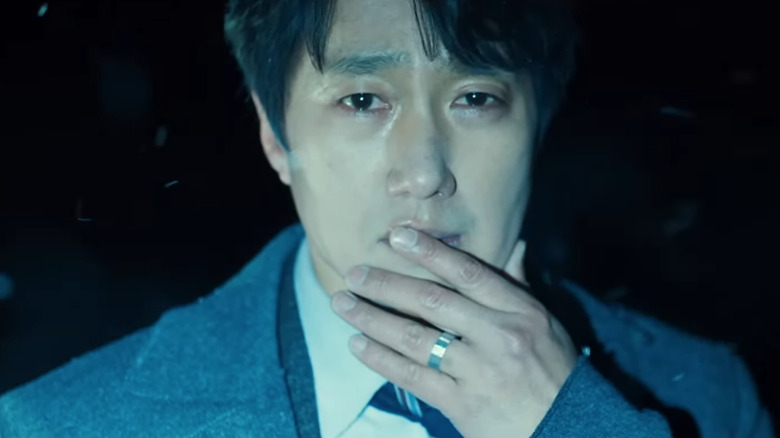Decision To Leave Review: Classic Hollywood Via Contemporary Korea
- Smart modernization of classic film noir tropes
- Compelling romantic chemistry
- Absolutely haunting ending
- Not Park Chan-wook's most entertaining film
Seo-rae (Tang Wei), the femme fatale at the center of Park Chan-wook's neo-noir "Decision to Leave," sure seems like she killed her husband. She insists she didn't, of course; in her telling, her spouse's violent fall from a steep cliffside was his own doing, and she has an alibi in the form of the old lady she takes care of. But this does little to reduce her utter suspiciousness, and honestly, with the stories she tells of her husband's abuse, you couldn't really blame her if she actually did the crime.
Hae-jun (Park Hae-il), the police detective assigned to the murder case, is the film's viewpoint character investigating Seo-rae, and between the time he spends spying on her and the time he spends speaking with her, his interest in this prime suspect turns into infatuation. Though he keeps up a long-standing agreement with his wife to have sex once a week even if they hate each other, his heart is with Seo-rae in an intense emotional affair. His desire to look the other way conflicts with his duties to pursue justice.
"Decision to Leave" is the movie for which Park Chan-wook won the best director award at the 2022 Cannes Film Festival, and this critic screened the picture at the Toronto International Film Festival. It is now being released in American theaters as a rare major theatrical release from the curated cinephile streaming service MUBI in hopes of a successful awards season run (it's South Korea's official submission to the best international feature Oscar). While it's not as original or intense as some of Park's previous films, it's the work of an extremely talented filmmaker telling an interesting story that should especially appeal to fans of classic film noir, tragic romance, and Alfred Hitchcock films.
A more classical, restrained Park Chan-wook film
Park Chan-wook became celebrated as one of the bad boys of Korean cinema with his gruesome Vengeance Trilogy ("Sympathy for Mr. Vengeance," "Oldboy," and "Lady Vengeance"), as well as subsequent genre provocations such as the vampire film "Thirst," his English-language thriller "Stoker," and the historical lesbian romance "The Handmaiden" (this critic's particular favorite of his oeuvre). "Decision to Leave" continues Park's development in "The Handmaiden" as a romantic storyteller, but also signals a move away from the shock and brutality that characterized his previous films.
You could say "Decision to Leave" is to Park's filmography as "Jackie Brown" is to Quentin Tarantino's: still operating in the same style and genre interests, but with significantly more restraint than usual. There are images of dead bodies and some brief fights, but no gore that would make you turn your eyes away; there's one humorous non-graphic sex scene to establish Hae-jun's struggling marriage, but most of the actual passion is chaste. This is might be the first Park Chan-wook film the average viewer could show their grandparents without complaint.
The classical Hollywood influences of "Decision to Leave" are many, from the similarly intense affair in David Lean's "Brief Encounter" to the mariticidal allure of Billy Wilder's "Double Indemnity." More than any other examples, however, the film to which "Decision to Leave" most directly draws comparisons is Alfred Hitchock's "Vertigo." There's the cop protagonist spending his time following a woman of interest around before getting more closely involved with her life, a suspicious unexpected reunion after a period of depression and separation, fears of heights, people throwing themselves into the ocean, dramatic dolly zooms, and memorable green dresses.
Even with its old-fashioned narrative influences, "Decision to Leave" is firmly set in the present day with an emphasis on how technology impacts the investigation. Locked phones, text messages, and step counters become valuable clues. Park's regular usage of low-angle shots frames scenes from various unusual perspectives, and when these perspectives come from the perspective of a phone, "selfie" imagery has never looked better. If Alfred Hitchcock had an iPhone, this might be close to the type of movie he would make.
Decision to Leave's ending is excellent
Critics have pretty much universally agreed that "Decision to Leave" is one a very good film, maybe even a great one. Tang Wei (best known for starring in Ang Lee's "Lust Caution") and Park Hae-il (from Bong Joon-ho's "Memories of Murder") have compelling chemistry with each other. Seo-rae's story as an undocumented Chinese immigrant living in South Korea gives the story a relevant topical edge, and the gaps between her Korean and Mandarin language abilities make for some particularly poetic moments (the subtitles are italicized when she's speaking in Mandarin). The editing and cinematography are creative and beautiful without being as in-your-face showy as some of Park's more extreme work, and though the overall mood is serious and contemplative, there are scenes that show the director's sense of humor.
The big debate among critics and cinephiles is going to be less about the quality of "Decision to Leave" and more about how it ranks among the rest of Park's filmography. In my opinion, it's a stronger film than "Thirst" and "Stoker" but isn't as entertaining or distinctive as "Oldboy" and "The Handmaiden." Restraint and classicism have their appeal and might be a selling point for some. In contrast to Park's wilder works, however, "Decision to Leave" has just enough of a sense of familiarity to it that it generally lacks the stunning quality that defines his best work.
Even if my reaction to the film as a whole is somewhat muted compared to the more effusive raves out there, one thing I did absolutely love was the film's ending. Without going into any spoilers, it's the sort of ending that sneaks up on you where you don't even realize how emotionally affected you are by these characters' fates until it hits you. It's of a piece with the general "Vertigo"/film noir homage plot line, but it's something that also works as a genuine surprise that makes perfect sense with our understanding of the characters' psychologies. This conclusion seriously boosts the impact of the film as a whole, and it will haunt you long after you've finished watching it.
"Decision to Leave" hits U.S. theaters on Friday, October 14.


